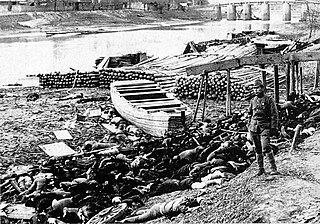Related Research Articles

State terrorism refers to acts of terrorism which a state conducts against another state or against its own citizens.

Terrorism, in its broadest sense, is the use of intentional violence and fear to achieve political or ideological aims. The term is used in this regard primarily to refer to intentional violence during peacetime or in the context of war against non-combatants. The terms "terrorist" and "terrorism" originated during the French Revolution of the late 18th century but became widely used internationally and gained worldwide attention in the 1970s during the Troubles in Northern Ireland, the Basque conflict, and the Israeli–Palestinian conflict. The increased use of suicide attacks from the 1980s onwards was typified by the 2001 September 11 attacks in the United States.
Pornography addiction is the scientifically controversial application of an addiction model to the use of pornography. Pornography may be part of compulsive sexual behavior with negative consequences to one's physical, mental, social, or financial well-being. While the World Health Organization's ICD-11 (2022) has recognized compulsive sexual behaviour disorder (CSBD) as an "impulsive control disorder", CSBD is not an addiction, and the American Psychiatric Association's DSM-5 (2013) and the DSM-5-TR (2022) do not classify compulsive pornography consumption as a mental disorder or a behavioral addiction.
Victor B. Cline (1925–2013) was a University of California, Berkeley Ph D in Psychology, a research scientist with the George Washington University’s Human Resources Research Office, and an Emeritus Professor in Psychology at the University of Utah. His private clinical practice was in Salt Lake City, Utah.
Abuse is the improper usage or treatment of a thing, often to unfairly or improperly gain benefit. Abuse can come in many forms, such as: physical or verbal maltreatment, injury, assault, violation, rape, unjust practices, crimes, or other types of aggression. To these descriptions, one can also add the Kantian notion of the wrongness of using another human being as means to an end rather than as ends in themselves. Some sources describe abuse as "socially constructed", which means there may be more or less recognition of the suffering of a victim at different times and societies.
A lone wolf attack, or lone actor attack, is a particular kind of mass murder, committed in a public setting by an individual who plans and commits the act on their own. In the United States, such attacks are usually committed with firearms. In other countries, knives are sometimes used to commit mass stabbings. Although definitions vary, most databases require a minimum of four victims for the event to be considered a mass murder.

The cycle of abuse is a social cycle theory developed in 1979 by Lenore E. Walker to explain patterns of behavior in an abusive relationship. The phrase is also used more generally to describe any set of conditions which perpetuate abusive and dysfunctional relationships, such as abusive child rearing practices which tend to get passed down. Walker used the term more narrowly, to describe the cycling patterns of calm, violence, and reconciliation within an abusive relationship. Critics suggest the theory was based on inadequate research criteria, and cannot therefore be generalized upon.
The term cycle of violence refers to repeated and dangerous acts of violence as a cyclical pattern, associated with high emotions and doctrines of retribution or revenge. The pattern, or cycle, repeats and can happen many times during a relationship. Each phase may last a different length of time, and over time the level of violence may increase. The phrase has been increasingly widespread since first popularized in the 1970s.

John G. Horgan is a Distinguished University Professor of Psychology at Georgia State University in Atlanta, Georgia. He studies involvement and engagement with terrorism, with a focus on disengagement and deradicalisation from terrorist movements. He has been described by the European Eye on Radicalization research group as the "world’s most distinguished expert in the psychology of terrorism". Since 2019, Horgan has been leading a team of researchers funded by the U.S. Department of Homeland Security to research the incel subculture.
Pedophilia is a psychiatric disorder in which an adult or older adolescent experiences a primary or exclusive sexual attraction to prepubescent children. Although girls typically begin the process of puberty at age 10 or 11, and boys at age 11 or 12, psychiatric diagnostic criteria for pedophilia extend the cut-off point for prepubescence to age 13.
The COPINE scale is a rating system created in Ireland and used in the United Kingdom to categorise the severity of images of child sex abuse. The scale was developed by staff at the COPINE project. The COPINE Project was founded in 1997, and is based in the Department of Applied Psychology, University College Cork, Ireland.
Victimisation is the state or process of being victimised or becoming a victim. The field that studies the process, rates, incidence, effects, and prevalence of victimisation is called victimology.
Child sexual abuse (CSA), also called child molestation, is a form of child abuse in which an adult or older adolescent uses a child for sexual stimulation. Forms of child sexual abuse include engaging in sexual activities with a child, indecent exposure, child grooming, and child sexual exploitation, such as using a child to produce child pornography.
A range of research has been conducted examining the link between viewing child pornography and perpetration of child sexual abuse, and much disagreement persists regarding whether a causal connection has been established. Perspectives fall into one of three positions:
Child pornography is unlawful pornography in most jurisdictions that exploits minors for sexual stimulation. It may be produced with the direct involvement or sexual assault of a child or it may be simulated child pornography. Abuse of the child occurs during the sexual acts or lascivious exhibitions of genitals or pubic areas which are recorded in the production of child pornography. Child pornography may use a variety of mediums, including writings, magazines, photos, sculpture, drawing, painting, animation, sound recording, video, virtual reality and video games. Child pornography may be created for profit or other reasons.
Dennis Howitt is a British psychologist. He is a reader in Applied Psychology at Loughborough University and the author of numerous psychology textbooks. He is a chartered forensic psychologist and a Fellow of the British Psychological Society. His publications also include books on statistics, computing and methodology.
Fathali M. Moghaddam is an Iranian-born psychologist, author, professor of psychology at Georgetown University and director of the Interdisciplinary Program in Cognitive Science (ICOS), Department of Government, Georgetown University.

Since the early 1970s, extrajudicial punishment attacks have been carried out by Ulster loyalist and Irish republican paramilitary groups in Northern Ireland. Attacks can range from a warning or expulsion from Northern Ireland, backed up by the threat of violence, to severe beatings that leave victims in hospital and shootings in the limbs. The cause of the attacks is disputed; proposed explanations include the breakdown of order as a result of the Northern Ireland conflict, ideological opposition to British law enforcement, and the ineffectiveness of police to prevent crime.

Cybersex trafficking, live streaming sexual abuse, webcam sex tourism/abuse or ICTs -facilitated sexual exploitation is a cybercrime involving sex trafficking and the live streaming of coerced sexual acts and/or rape on webcam.
Ethel Quayle is British clinical psychologist. She is Personal Chair of Forensic Clinical Psychology at the University of Edinburgh. She researches sexual crimes against children, particularly sexual offenses involving the internet.
References
- ↑ Veale, A., Taylor, M. (1996) 'The problem of street children: Parallel causes and intervention' In: Carr, s. Schumaker, J (eds). Psychology and the Developing world Greenwood Publishing. ( ISBN 0275952452).
- ↑ Veale, A., Taylor, M & Linehan, C. (2000) 'Psychological perspectives of 'abandoned' and 'abandoning' street children' In: Cambridge University Press (eds). Abandoned children. ( ISBN 0521775558)
- ↑ Nolan, Larissa, Sweeney, Conor (30 January 2005). Paedophile trackers wind down project The Independent
- ↑ Crown Prosecution Service (August 2010). Indecent photographs of children Archived 24 August 2011 at the Wayback Machine
- ↑ Quayle, Ethel (September 2008). "The COPINE Project" (PDF). Irish Probation Journal. Probation Board for Northern Ireland. 5. ISSN 1649-6396. Archived from the original (PDF) on 5 December 2013.
- ↑ Taylor, M.; Quayle, E.; Holland, G. (2001). "Child Pornography, the Internet and Offending". The Canadian Journal of Policy Research. ISUMA. 2 (2): 94–100.
- ↑ Online Certificate in Terrorism Studies training course via University of St Andrews